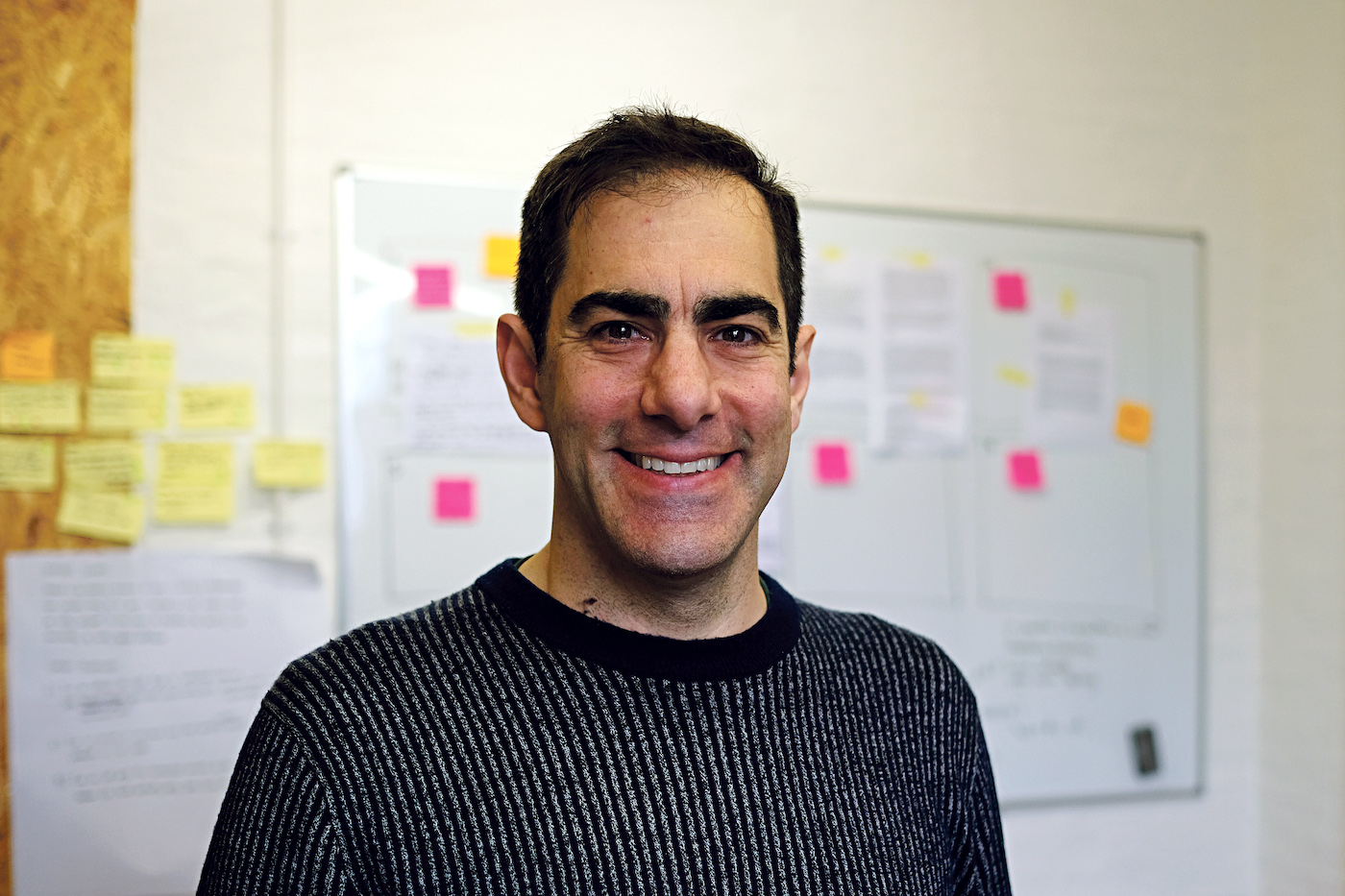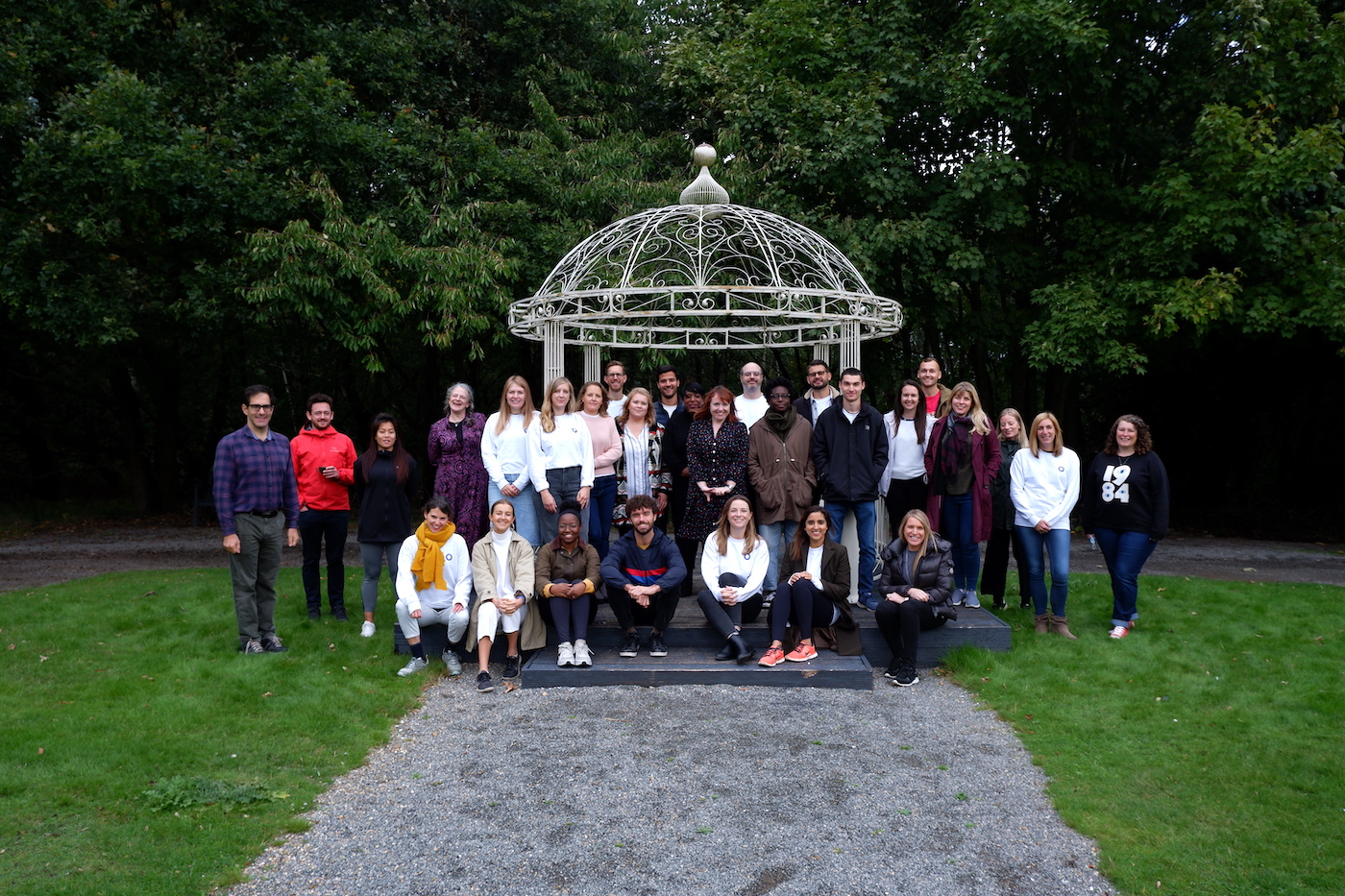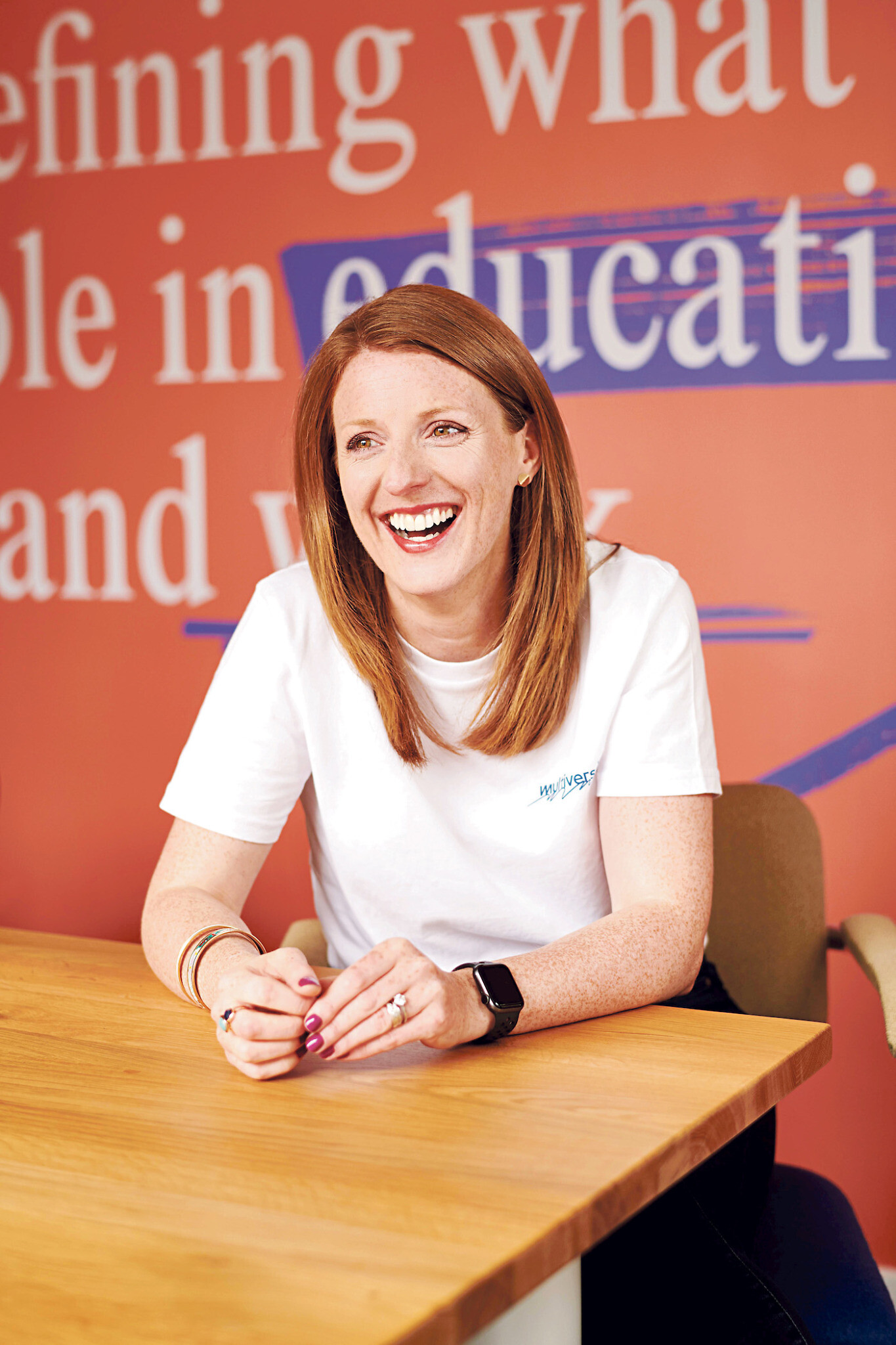The firms that change the way we view education
The founders and leaders of ‘edtech’ companies tell Candice Krieger why they are focusing on solving some of challenges from preschool to post school
Education technology, aka edtech, came to the fore during lockdown as children across the globe transitioned out of schools to learning online. And while it was the marvels of remote learning that hit the headlines, there has been an array of other tech tools emerging to solve some of the shortcomings of the traditional education industry, from preschool
to post-school.
This might be removing the administrative burden for teachers and practitioners, or helping students to secure jobs after school.
The UK’s edtech is now the largest in Europe, on target to be worth more than £3.4 billion by the end of the year according to the Digital Economy Council. Globally, edtech is reportedly estimated to be worth around £200 billion ($270 billion), underlining the UK’s expansion potential.
Get The Jewish News Daily Edition by email and never miss our top stories Free Sign Up
Three start-ups already having a huge impact in the arena from pre-school to post-school are: MyTutor, the nation’s leading provider of online tutoring, Tiney, an app that trains and supports childminders to set up and run their business, and Euan Blair’s Multiverse, which provides high-quality apprenticeships as an alternative to university.
MyTutor
MyTutor aims to provide tuition for everyone, regardless of circumstance. Described by one of its founders, James Grant, as “a kind of Airbnb for tutors”, it connects those looking for tutors with students from the UK’s top universities.
Sessions are run online, meaning proximity is irrelevant and costs are lower, typically between £20 to £40 an hour. In addition to partnering directly with parents and families, MyTutor also works with more than 1,000 schools and universities to reach children from disadvantaged backgrounds. It is an approved partner for the government’s National Tutoring Programme (NTP) that aims to make high-quality tutoring available to schools, at a heavily subsidised rate, to help disadvantaged pupils whose education has been affected by school closures.

“Previously, tutoring was seen as a bit of an unfair advantage for those who could afford it,” says Grant, 30. “But it is now the key pillar of the government’s education strategy.
“Tutoring is the most robust way of helping students alongside their regular studies and the government wants to scale this up. It is no longer just for the small percentage who can access it through their families.”
The platform was founded by Grant, Robert Grabiner and Bertie Hubbard in 2013. Grabiner was frustrated by how hard it was to find a tutor for his daughters, while analyst Hubbard wanted to take an evidence-led approach to solving some of the education sector’s biggest challenges. Entrepreneur Grant, who has a background in running events and student nights, was passionate about helping disadvantaged children to do better at school. Fast forward a decade and the edtech landscape has changed massively.
“Online tutoring was really new when we launched,” recalls Grant. “When everything went online during the pandemic, people got to try to understand online tutoring, realising that it was not a step down. There are many benefits such as recording lessons, watching them back and accessing tutors from anywhere.”
He adds: “We have seen that parents are much more engaged with their children’s education in a way they weren’t before. There’s more openness now about tutoring and it’s become more normalised.”
MyTutor has grown considerably since the pandemic, from 45 to 260 full-timers and 15,000 tutors. It has become the UK’s most trusted platform for online tuition, raising £30 million to date.
While Grant says online tutoring won’t ever eradicate in-person tutoring, he believes it will become the dominant force. “The tech will improve and you can get more of what you don’t limit yourself to in person and a certain radius.”
Grant, a member of Edgware Reform Synagogue, spent 18 months at Barclays on its graduate programme, where he joined the Chief of Staff team, speech writing for senior figures. He then came up with the idea for MyTutor, built the website and raised £150,000 from friends and family. In September 2021, MyTutor launched its debut national media campaign, You Never Stop Worrying, directed by Sir Ridley Scott’s son, Jake, which ran across TV and radio to increase parental involvement in online education.
What other edtech trends does he see happening? “There will be a lot of thinking about new subjects being placed on the curriculum; things such as digital skills, mental health and financial literacy.”
MyTutor recently bought FireTech, which delivers live online coding courses for kids during the school holidays – their first step towards this future curriculum.
Tiney
Tiney is using tech to transform early years provision. Through its app, Tiney provides educators with all the training and resources they need to set up and run their own childminder businesses from home.
Founded in 2020 by entrepreneur Brett Wigdortz OBE and Edd Read, the former co-founder and chief technology officer of Graze, Tiney has already made a huge impact. Some 300 childminders are up and running via the platform, with more than 500 in training – a number expected to double over the next couple of months.

Wigdortz says: “A lack of good people is by far the biggest challenge facing early years education. Because ratios need to be small, you need a lot of great adults, and to attract great people you need to be able to pay a decent salary. By using great tech, we are reducing many of the overheads meaning the childminders can keep most of their income.”
Tiney deals with many of the typical pain points, such as managing payments and contracts, in addition to training, continuing developing and publishing activities for the children, plus a tracker to help them log what they have done. It takes a 10 percent commission on every job booked through the platform.
“I realised lot of children were entering primary school not ready to learn. The importance of early years education cannot be underestimated, yet is totally under-resourced, and this was the next problem I wanted so solve.”
Wigdortz, an ex-McKinsey consultant, previously founded Teach First, the largest graduate recruiter in the UK to address the lack of teachers in disadvantaged areas. It became a $100m turnover company with 600 employees. US-born Wigdortz, who moved to the UK 20 years ago and lives in East Finchley with his wife and three children, stepped down as its chief executive officer in 2017.
“I always start with the problem, and with Teach First, it was about there not being enough teachers in low-income schools that need them the most. With Tiney, it’s about the importance of early years and people not being able to find good early years childcare.”

He adds: “We would love to get more Jewish applicants. A lot of our childminders come from religious and ethnic groups, and a lot who work in a bilingual fashion, so would love to find some Israeli people who might be interested.
“It’s great for anyone who wants to work from home and look after their children.”
And Wigdortz, a cheder teacher at New North London Synagogue, is not alone in seeing the potential. Tiney has raised around £8m to date, including a recent £5m round from venture capital firms Index Ventures, LocalGlobe, founded by Robin and Saul Klein, and JamJar, the investment firm linked to the Innocent Drinks founders.
Launched in 2019, Tiney was gathering momentum when the pandemic hit. While its nurseries had to close for a few months, it enabled the company to focus on developing the technology.
“Once we could open again, things have moved pretty fast. The pandemic has got people to look at jobs differently, and it became more acceptable to work from home.”
The pandemic has also accelerated our willingness to explore what edtech can bring to the table. Where does Wigdortz see the big opportunities?
“It’s less about the whizzy things to jazz up the classroom but more about using technology to empower and support the educators themselves. And it’s about reducing the admin load for teachers. Many find it difficult understanding the needs of each learner and tech can help them differentiate the children and ensure each child is learning in the right way.”
Multiverse
Euan Blair’s record-breaking start-up is on a mission to create a diverse set of future leaders and get young people ready for the workforce of tomorrow by providing high-quality apprenticeships as an alternative to university. Focusing on the skills of the future, the Multiverse platform measures potential beyond academic achievement, matching school leavers with hundreds of employers, including Google, Facebook, and KPMG.
It has been named the number one start-up in the UK by startups.co.uk and recently raised £95m ($130m) in Series C funding to meet growing demand for professional apprenticeships.
Libby Dangoor, Multiverse’s chief of staff, says: “People are realising the future of work is changing and that university does not necessarily provide the skillset for success, particularly within tech. We don’t have an effective alternative to university and this was something that was really needed.

“I have seen how amazing a route apprenticeships can be and while there is space for both university and apprenticeships, they represent an outstanding alternative.”
The online-only teaching environment of the pandemic has helped drive demand for apprenticeships as people questioned the value they might get from higher education compared to going straight into employment.
“We have had people turn down places at Oxford to do apprenticeships,” notes Dangoor. “Multiverse creates a strong apprenticeship community, which is a very powerful part of its offering,” explains the mother-of-three who joined Multiverse in 2019.
A former consultant at Bain & Company, she is passionate about education. “I was the first generation of my family to go to university and this broadened the sense of possibilities available to me. It has driven me to focus on the equality of opportunity available for others.”
Dangoor also has a history of non-profit organisational management, having been portfolio director at the Social Business Trust, venture partner at ARK, a charity that aims to transform children’s lives through education, and operations director at Now Teach, which encourages people who have already had one successful career to retrain as teachers.
She chairs the UK Advisory Board of PJ Library, which distributes free, award-winning books that celebrate Jewish values and culture to families with children up to nine years old.
“I found that the not-for-profit sector is often structured in a way that makes it challenging to achieve the necessary pace and scale required to really make a difference.”
Multiverse has done exactly that. Since launching in 2016, it has delivered more than 5,000 apprenticeships while also expanding into the US. Last year, it broke the record for the UK’s largest edtech venture funding round. Investors included General Catalyst, Google Ventures, Index Ventures, Audacious Ventures, D1, and Bond Capital. These institutions were supported by angel investors, including John W Thomson, chairman of Microsoft, and Jeremy Darroch, chairman of Sky.
Dangoor, a governor at Westminster Academy, says one of the biggest challenges the sector faces is preparing people for the ever-changing workforce of the future. “Uncertainty is one thing we can be certain of and being able to adapt quickly within our education system is going to be a continual challenge.
“During the pandemic, some schools had to scramble to ensure the tech was in place for their students – they need to make sure they are on the front foot. Unfortunately, the attainment gap has widened and this is something we need to look at to ensure everyone has the tech support they need and people have the skillset ready for the future workplace – not
just technology skills, but also teamwork and collaboration.”
She believes some of the big opportunities within edtech will be around the delivery of content and how it engages people, particularly through ‘async’ content, where learning doesn’t necessarily happen at the same time for the instructor and the learners; the content is created and made available for students to engage with on their own schedules. “There will be some really interesting developments in the way we design learning journeys and the content we deliver.”

Thank you for helping to make Jewish News the leading source of news and opinion for the UK Jewish community. Today we're asking for your invaluable help to continue putting our community first in everything we do.
For as little as £5 a month you can help sustain the vital work we do in celebrating and standing up for Jewish life in Britain.
Jewish News holds our community together and keeps us connected. Like a synagogue, it’s where people turn to feel part of something bigger. It also proudly shows the rest of Britain the vibrancy and rich culture of modern Jewish life.
You can make a quick and easy one-off or monthly contribution of £5, £10, £20 or any other sum you’re comfortable with.
100% of your donation will help us continue celebrating our community, in all its dynamic diversity...
Engaging
Being a community platform means so much more than producing a newspaper and website. One of our proudest roles is media partnering with our invaluable charities to amplify the outstanding work they do to help us all.
Celebrating
There’s no shortage of oys in the world but Jewish News takes every opportunity to celebrate the joys too, through projects like Night of Heroes, 40 Under 40 and other compelling countdowns that make the community kvell with pride.
Pioneering
In the first collaboration between media outlets from different faiths, Jewish News worked with British Muslim TV and Church Times to produce a list of young activists leading the way on interfaith understanding.
Campaigning
Royal Mail issued a stamp honouring Holocaust hero Sir Nicholas Winton after a Jewish News campaign attracted more than 100,000 backers. Jewish Newsalso produces special editions of the paper highlighting pressing issues including mental health and Holocaust remembrance.
Easy access
In an age when news is readily accessible, Jewish News provides high-quality content free online and offline, removing any financial barriers to connecting people.
Voice of our community to wider society
The Jewish News team regularly appears on TV, radio and on the pages of the national press to comment on stories about the Jewish community. Easy access to the paper on the streets of London also means Jewish News provides an invaluable window into the community for the country at large.
We hope you agree all this is worth preserving.
-
By Brigit Grant
-
By Laurent Vaughan - Senior Associate (Bishop & Sewell Solicitors)
-
By Laurent Vaughan - Senior Associate (Bishop & Sewell Solicitors)
-
By Laurent Vaughan - Senior Associate (Bishop & Sewell Solicitors)
-
By Laurent Vaughan - Senior Associate (Bishop & Sewell Solicitors)






















